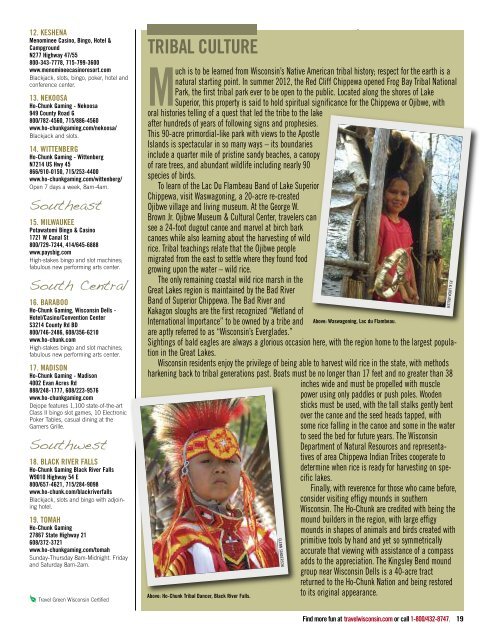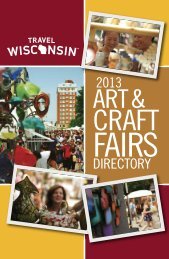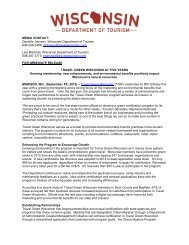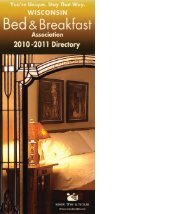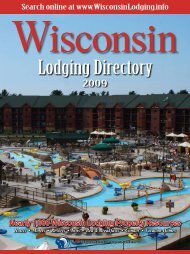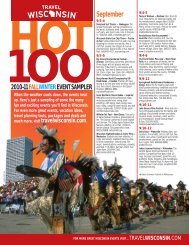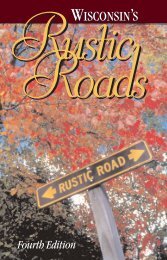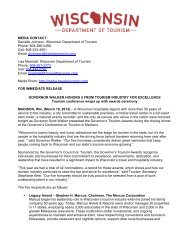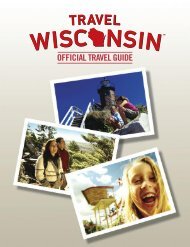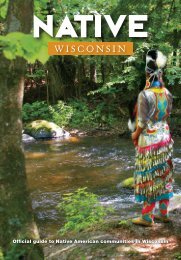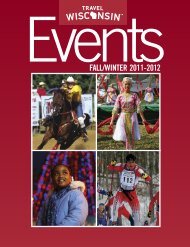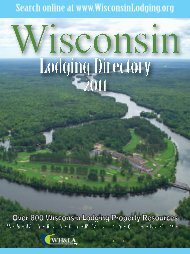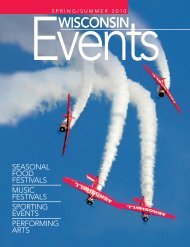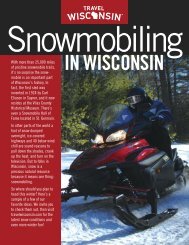INDOOR ESCAPESCasinos<strong>Wisconsin</strong>’s Native American tribes <strong>of</strong>fer visitors gaming andbingo action in 19 locations around the state, with many <strong>of</strong> thecasinos having fine dining and lodging attached to them. Thestate is home to 11 tribes, the most <strong>of</strong> any state east <strong>of</strong> theMississippi, and their museums, historic villages and authenticpow-wows are all chronicled on Travel<strong>Wisconsin</strong>.com.Northwest1. DANBURYSt. Croix Casino Danbury30222 Highway 35 and Highway 77800/846-8946www.danbury.stcroixcasino.com600 slots and 18 table games, includingone roulette table, two craps tables andfour poker tables. The casino <strong>of</strong>fers afull array <strong>of</strong> food and beverage options.New lounge <strong>of</strong>fering live entertainmenton weekends.2. HAYWARDLCO Casino, Lodge & Convention Center13767 W County Road B800/526-2274, 715/634-5643www.lcocasino.comBlackjack, slots, bingo, lodging andlounge.3. ODANAHBad River Lodge, Casino & ConventionCenter73370 US Highway 2800/777-7449, 715/682-7121www.badriver.com460 video poker and slot machines, sixblackjack tables. Restaurant, snack bar,50-room lodge (includes 8 jacuzzisuites) and convention center, gift shop,grocery/convenience store, and 15-siteRV campground.1654. RED CLIFFLegendary Waters Resort & Casino37600 Onigamiing Drive800/226-8478, 715/779-3712www.legendarywaters.com/Video poker, slots, blackjack and bingo.5. TURTLE LAKESt. Croix Casino, Hotel & RV Park777 US Highway 8 & 63800/846-8946,www.stcroixcasino.comBlackjack, slots and bingo. 158-unithotel with restaurant, RV Park and liveentertainment.18 Find more fun at travelwisconsin.com or call 1-800/432-8747.24318191391671014 11 1217815Above: Potawatomi Bingo & Casino, Milwaukee.POTAWATOMI BINGO & CASINOAbove: Ho-Chunk Gaming, Baraboo.Top: Menominee Casino, Keshena.6. WEBSTERSt. Croix Casino Hertel Express4384 State Highway 70715/349-5658www.hertelexpress.comTry your luck on one <strong>of</strong> the 148 hot slotsat St. Croix Casino Hertel Express. We<strong>of</strong>fer a variety <strong>of</strong> brand-new slots as wellas old favorites in denominations from apenny to a dollar. Best <strong>of</strong> all, our serviceis always fast and friendly. Great games,warm atmosphere, great service.Northeast7. CRANDONMole Lake Casino, Lodge & ConferenceCenter3084 Hwy 55 S800/236-9466, 715/478-7556www.molelake.com500 reel slot and video machines, 6blackjack tables and bingo hall.8. GREEN BAYOneida Bingo & Casino2020 Airport Dr # 2100800/238-4263, 920/494-4500www.oneidabingoandcasino.netBlackjack tables, bingo, slots and videomachines.9. LAC DU FLAMBEAULake <strong>of</strong> the Torches Bingo424 Little Pines Rd800/44S-HOUT, 715/588-4217www.lake<strong>of</strong>thetorches.com/bingo/High-stakes and satellite bingo. Snackbar.Lake <strong>of</strong> the Torches Resort Casino510 Old Abe Rd800/25T-ORCH, 715/588-7070www.lake<strong>of</strong>thetorches.comBlackjack, slots and bingo; hotel andconference center.10. WABENOPotawatomi Carter Casino Hotel618 State Highway 32800/487-9522, 715/473-2021www.cartercasino.comOpen 24 hours a day, 7 days a week.Central11. BOWLERNorth Star Mohican Casino ResortW12180 County Road A800/775-2274www.mohicannorthstar.com1,200+ slot machines, 18 blackjacktables, and private hi-stakes blackjackarea. Cafe, full-service bar and RVcamping on-site. 97 non-smoking guestrooms richly appointed for comfort andrelaxation, we <strong>of</strong>fer the highest resortstandards in every sense. Golf, bike andsnowmobile trails nearby.MENOMINEE CASINOWISCONSIN DELLS VCB
12. KESHENAMenominee Casino, Bingo, Hotel &CampgroundN277 Highway 47/55800-343-7778, 715-799-3600www.menomineecasinoresort.comBlackjack, slots, bingo, poker, hotel andconference center.13. NEKOOSAHo-Chunk Gaming - Nekoosa949 County Road G800/782-4560, 715/886-4560www.ho-chunkgaming.com/nekoosa/Blackjack and slots.14. WITTENBERGHo-Chunk Gaming - WittenbergN7214 US Hwy 45866/910-0150, 715/253-4400www.ho-chunkgaming.com/wittenberg/Open 7 days a week, 8am-4am.Southeast15. MILWAUKEEPotawatomi Bingo & Casino1721 W Canal St800/729-7244, 414/645-6888www.paysbig.comHigh-stakes bingo and slot machines;fabulous new performing arts center.South Central16. BARABOOHo-Chunk Gaming, <strong>Wisconsin</strong> Dells -Hotel/Casino/Convention CenterS3214 County Rd BD800/746-2486, 608/356-6210www.ho-chunk.comHigh-stakes bingo and slot machines;fabulous new performing arts center.17. MADISONHo-Chunk Gaming - Madison4002 Evan Acres Rd888/248-1777, 608/223-9576www.ho-chunkgaming.comDejope features 1,100 state-<strong>of</strong>-the-artClass II bingo slot games, 10 ElectronicPoker Tables, casual dining at theGamers Grille.Southwest18. BLACK RIVER FALLSHo-Chunk Gaming Black River FallsW9010 Highway 54 E800/657-4621, 715/284-9098www.ho-chunk.com/blackriverfallsBlackjack, slots and bingo with adjoininghotel.19. TOMAHHo-Chunk Gaming27867 State Highway 21608/372-3721www.ho-chunkgaming.com/tomahSunday-Thursday 8am-Midnight. Fridayand Saturday 8am-2am.Travel Green <strong>Wisconsin</strong> CertifiedTRIBAL CULTUREMuch is to be learned from <strong>Wisconsin</strong>’s Native American tribal history; respect for the earth is anatural starting point. In summer 2012, the Red Cliff Chippewa opened Frog Bay Tribal NationalPark, the first tribal park ever to be open to the public. Located along the shores <strong>of</strong> LakeSuperior, this property is said to hold spiritual significance for the Chippewa or Ojibwe, withoral histories telling <strong>of</strong> a quest that led the tribe to the lakeafter hundreds <strong>of</strong> years <strong>of</strong> following signs and prophesies.This 90-acre primordial-like park with views to the ApostleIslands is spectacular in so many ways – its boundariesinclude a quarter mile <strong>of</strong> pristine sandy beaches, a canopy<strong>of</strong> rare trees, and abundant wildlife including nearly 90species <strong>of</strong> birds.To learn <strong>of</strong> the Lac Du Flambeau Band <strong>of</strong> Lake SuperiorChippewa, visit Waswagoning, a 20-acre re-createdOjibwe village and living museum. At the George W.Brown Jr. Ojibwe Museum & Cultural Center, travelers cansee a 24-foot dugout canoe and marvel at birch barkcanoes while also learning about the harvesting <strong>of</strong> wildrice. Tribal teachings relate that the Ojibwe peoplemigrated from the east to settle where they found foodgrowing upon the water – wild rice.The only remaining coastal wild rice marsh in theGreat Lakes region is maintained by the Bad RiverBand <strong>of</strong> Superior Chippewa. The Bad River andKakagon sloughs are the first recognized “Wetland <strong>of</strong>International Importance” to be owned by a tribe andare aptly referred to as “<strong>Wisconsin</strong>’s Everglades.”Above: Waswagoning, Lac du Flambeau.Sightings <strong>of</strong> bald eagles are always a glorious occasion here, with the region home to the largest populationin the Great Lakes.<strong>Wisconsin</strong> residents enjoy the privilege <strong>of</strong> being able to harvest wild rice in the state, with methodsharkening back to tribal generations past. Boats must be no longer than 17 feet and no greater than 38inches wide and must be propelled with musclepower using only paddles or push poles. Woodensticks must be used, with the tall stalks gently bentover the canoe and the seed heads tapped, withsome rice falling in the canoe and some in the waterto seed the bed for future years. The <strong>Wisconsin</strong><strong>Department</strong> <strong>of</strong> Natural Resources and representatives<strong>of</strong> area Chippewa Indian Tribes cooperate todetermine when rice is ready for harvesting on specificlakes.Finally, with reverence for those who came before,consider visiting effigy mounds in southern<strong>Wisconsin</strong>. The Ho-Chunk are credited with being themound builders in the region, with large effigymounds in shapes <strong>of</strong> animals and birds created withprimitive tools by hand and yet so symmetricallyaccurate that viewing with assistance <strong>of</strong> a compassadds to the appreciation. The Kingsley Bend moundAbove: Ho-Chunk Tribal Dancer, Black River Falls.GLENN SANDERSONgroup near <strong>Wisconsin</strong> Dells is a 40-acre tractreturned to the Ho-Chunk Nation and being restoredto its original appearance.RJ & LINDA MILLERFind more fun at travelwisconsin.com or call 1-800/432-8747. 19
- Page 1 and 2: TMACTIVITYGUIDE
- Page 4 and 5: Food& DrinkToursWISCONSIN MILK MARK
- Page 6 and 7: FOOD & DRINK TOURSCHEESE FACTORY TO
- Page 8 and 9: Winery ToursFOOD & DRINK TOURSIt wa
- Page 10 and 11: On-RoadAdventuresTime to breathe in
- Page 12 and 13: ON-ROAD ADVENTURESSCENIC DRIVES, co
- Page 14 and 15: ON-ROAD ADVENTURESLighthousesGrante
- Page 16 and 17: ON-ROAD ADVENTURES4WaterfallsDespit
- Page 18 and 19: IndoorEscapesWISCONSIN DELLS CVBIf
- Page 22 and 23: Water ParksINDOOR ESCAPESWisconsin
- Page 24 and 25: SpectatorSportsBRIAN MALLOYWe’ll
- Page 26 and 27: Minor League BaseballSPECTATOR SPOR
- Page 28 and 29: SPECTATOR SPORTSAuto RacingIs it po
- Page 30 and 31: The GreatOutdoorsROBB FISCHERMy par
- Page 32 and 33: THE GREAT OUTDOORSBIKING TRAILS, co
- Page 34 and 35: THE GREAT OUTDOORSBIRDING, continue
- Page 36 and 37: HORSEBACK RIDING, continuedTHE GREA
- Page 38 and 39: FishingDOUG STAMMTHE GREAT OUTDOORS
- Page 40 and 41: THE GREAT OUTDOORSCharter FishingCh
- Page 42 and 43: CHARTER FISHING, continuedTHE GREAT
- Page 44 and 45: THE GREAT OUTDOORSCHARTER FISHING,
- Page 46 and 47: ATV TrailsTHE GREAT OUTDOORSATVing
- Page 48 and 49: NationalTreasuresRJ & LINDA MILLERW
- Page 50 and 51: NATIONAL TREASURESChequamegon/Nicol
- Page 52 and 53: Fun onthe WaterROBB FISCHERSaid it
- Page 54 and 55: CANOEING & KAYAKING, continuedFUN O
- Page 56 and 57: CANOEING & KAYAKING, continuedFUN O
- Page 58 and 59: CANOE RIVERS, continuedFUN ON THE W
- Page 60 and 61: FUN ON THE WATERTubing & RaftingIt
- Page 62 and 63: Boat Tours & Sailing ChartersFUN ON
- Page 64 and 65: FUN ON THE WATERBOAT TOURS & SAILIN
- Page 66 and 67: Fun inthe SnowGLENN SANDERSONOh ye
- Page 68 and 69: FUN IN THE SNOWSNOWMOBILING & DOWNH
- Page 70 and 71:
Cross-country SkiingFUN IN THE SNOW
- Page 72 and 73:
CROSS-COUNTRY SKIING, continuedFUN
- Page 74 and 75:
SnowmobilingFUN IN THE SNOWCarl Eli
- Page 76 and 77:
SNOWMOBILING continuedFUN IN THE SN
- Page 78 and 79:
SleighridesFUN IN THE SNOWMight a s
- Page 80 and 81:
TOURISM CONTACTSDo you need informa
- Page 82 and 83:
TOURISM CONTACTSReedsburg Area Cham
- Page 84:
More FreeWisconsinTravelGuidesOffic


